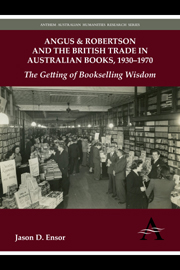 Angus & Robertson and the British Trade in Australian Books, 1930–1970
Angus & Robertson and the British Trade in Australian Books, 1930–1970 Although this book is not the first study to interrogate the extensive Mitchell Library holdings of the Angus & Robertson archives with regards to the company's business operations, it is the first whose central concern is the company's production and distribution of Australian books within the United Kingdom through its London office. Often footnoted as worthy of further investigation, this is an area of history which to date has only been narrowly scoped without reference to key archival volumes held by the State Library of New South Wales, Australia. Heather Rusden's interview with Alec Bolton and Suzanne Lunney's interviews with George Ferguson, Douglas Stewart and Ernie Williams provide some context but are limited due to the anecdotal nature of reminiscences. The majority of material published on Angus & Robertson, which is substantial, also records very little about the company's London operations. The best account is by Neil James in 2000, which places the London office's business within the framework of the Australian company's general overseas operations. It draws on interviews conducted by James with publisher George Ferguson and former occasional London office employees John Ferguson, David Moore and Sam Ure Smith. These also take the form of reminiscences regarding operations and managers in the United Kingdom. Essays appearing in the firm's own publication, Fragment: The House Magazine of Angus & Robertson and Halstead Press (1954–9), offer further perspective and so does commentary from Collins' Australian managing director, Ken Wilder, ‘who sat on the Angus & Robertson board with a watching brief‘ during the 1960s.
To save this book to your Kindle, first ensure [email protected] is added to your Approved Personal Document E-mail List under your Personal Document Settings on the Manage Your Content and Devices page of your Amazon account. Then enter the ‘name’ part of your Kindle email address below. Find out more about saving to your Kindle.
Note you can select to save to either the @free.kindle.com or @kindle.com variations. ‘@free.kindle.com’ emails are free but can only be saved to your device when it is connected to wi-fi. ‘@kindle.com’ emails can be delivered even when you are not connected to wi-fi, but note that service fees apply.
Find out more about the Kindle Personal Document Service.
To save content items to your account, please confirm that you agree to abide by our usage policies. If this is the first time you use this feature, you will be asked to authorise Cambridge Core to connect with your account. Find out more about saving content to Dropbox.
To save content items to your account, please confirm that you agree to abide by our usage policies. If this is the first time you use this feature, you will be asked to authorise Cambridge Core to connect with your account. Find out more about saving content to Google Drive.